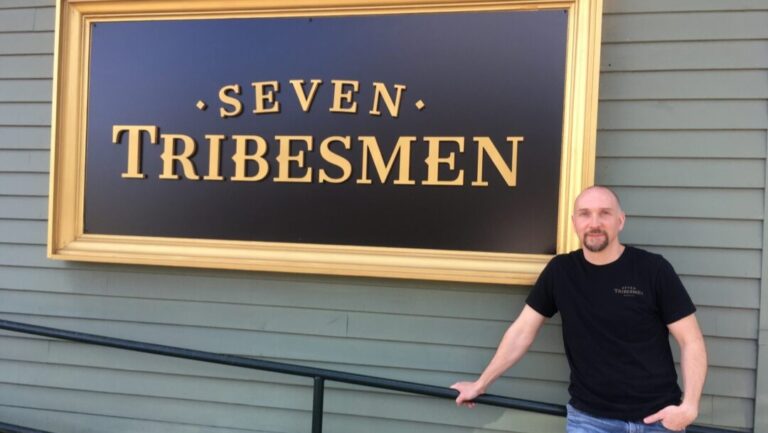James Allan is a Canadian-Australian law professor currently teaching at Queensland University. He is a renowned expert on constitutional law and legal philosophy, a columnist of several high-profile newspapers, and the author of five books. He has arrived in Budapest at the invitation of the Danube Institute to give lectures on constitutional law, human rights, and free speech issues, among others. In the following interview, we will be discussing the relationship between judicial and legislative bodies in democratic systems, the rule-of-law dispute between Central Europe and Brussels, Hungary’s upcoming election, and the cultural and political state of the West in general.
I am going to start by what you are best known for, perhaps, that is being the author of the book Democracy in Decline: Steps in the Wrong Direction. Could you briefly outline the main thesis of that book?
Well, if you understand democracy as counting everyone equally and then making public policy should be based on what the majority of people vote for. Now some people try to redefine democracy, so it is just really equivalent to morally good outcomes. It is only democratic if it has morally good outcomes. But the problem with that is that people disagree about all sorts of moral issues, almost all of them. And so, I think you have to understand democracy as a procedural tool, a way to find out the preferences of most people. And in that sense, I think the last 20 years have seen judges, bureaucrats, members of supernational organizations, who have been trying to chip away at the decision-making power of majoritarian politics. They can do it through bills of rights, through human rights instruments, through how they interpret treaties. They can do it through the administrative state, which moves beyond the sort of powers that the statute might give it. And so, they are undercutting the sort of say that the average citizen has and I am not in favour of that. Although I have to say that the average member of the lawyerly caste seems to me to be in favour of taking decisions away from plumbers and secretaries and giving them to top judicial figures, top bureaucrats, or even top corporate executives.
One of the major themes of your recent panel discussion at Danube Institute was about how to find a balance between the powers of supreme courts and elected legislative bodies in a political construction.
Yes. I think Hungary is feeling this right now. In Hungary, it is more of your relationship with the EU, which is not really a very democratic body. And that is a problem.
We are going to talk about that later, but first I just wanted to ask, if you could imagine a perfect political system where the judiciary and legislative powers are balanced? Can you think of examples, if there are any?
Well, no, there is no perfect setup. Different people will make different bargains. There are always downsides. There is no perfect voting system. There are costs as well as benefits to any voting system. There are costs as well as benefits to whether you have a strong upper house, strong bicameralism. America, Australia, Italy have very strong upper houses. In most democracies, it is not nearly that strong. And in the rest of the English-speaking world, the upper house, really, is impotent. The UK has an unelected upper house to this day. Canada has an unelected upper house. They, don’t have any credibility. They don’t do anything, really. New Zealand has no upper house. So, you can make those kinds of trade-offs. You can make trade-offs on how strong and what sort your federalism is if you have a federal system.
I quite like the old-fashioned British parliamentary sovereignty system, but the bigger your country is the harder it is to do that
And one of the problems with the EU, of course, is that it’s an unusual sort of federalism. You have elected national governments playing the role of states and then playing the role of the centre, instead of an elected body, is a sort of combination of a commission, a council, and a really enervated parliament. That’s just odds. You’ve always got trade-offs. There is no perfect system, different people make different bargains. I quite like the old-fashioned British parliamentary sovereignty system, but the bigger your country is the harder it is to do that. I think it is the most democratic because at the end of the day, the elected politicians make all the important calls and your recourse as a citizen is to vote them out. So, if you think that you are sick of twelve years of Tony Blair, you vote him out. The Americans make a slightly different bargain, they build in a lot of checks and balances. They’re trying to aim for a bit more certainty and not up and down with each election. But somebody has to police those checks and balances. And if they start becoming a bit wayward at the point of application, as the supposedly neutral umpire, you got problems. But the American system has lasted 230 years. The British system has lasted three or four hundred years, so those are the two long-standing systems in the Western world. Neither is perfect, there are always trade-offs. I think newer democratic countries find the American system—with all of its checks and balances—pretty tough. Doesn’t really work very well because there’s so much blocking. It is very hard to pass a budget in the US. You have to get it through two houses. They almost never do. You get government shutdown half the time. But you can do that in the US. It is wealthy, it has got a history. A newly democratic country in Africa cannot afford that. So, in different situations, you will make different bargains. Nothing is perfect.
The unified opposition which is challenging the current Hungarian government this spring has promised repeatedly to rewrite the Hungarian Constitution, even if they do not get the needed two-thirds constitutional majority in the election. With just a simple majority, they would ignore the supreme court and legitimize the changes through a referendum if needed, a move which many experts call a ‘constitutional coup d’etat’. Could such a course of action be ever considered legitimate?
Well, at the end of the day, every system exists only because the officials and the citizens accept it. If you woke up tomorrow and Americans did not accept the Constitution, then you would have a different system. This point was also made by Herbert L. A. Hart. So, for instance, in the US, the Articles of Confederation just were not working and they had to lay down a route for changing it. And the Madisons of the world just ignored it. The Federalists ignored it. They just came up with the new constitution that they passed, basically, through referenda. The fact of the matter is if enough people agree with this new setup, then you have a new setup. You have a new rule of recognition, or what Kelsen described as a new ‘Grundnorm’. They are just facts on the ground. Now, that is not easy to pull off. I suspect they will not be successful, but if 80 per cent of the population decides they want a new constitution and they do not care about what the old constitution said, then the old constitution will be as relevant as the Articles of Confederation. It will be worthless. That is not easy to pull off, especially if they barely win the election. I do not think that they would actually pull it off, but presumably, people will have that in mind when they come to vote in this next election because it would probably hurt them, I guess.
That is a great insight. Now let’s move on a bit to Brussels. There is this great ongoing battle between the European Court of Justice and a couple of central European sovereigntist states, mainly Poland and Hungary, about whether they have functional rule-of-law. And many conservatives feel that this question had been politicized to the point where it is not about the law anymore, but ideological and political differences.
I have read German academics who think that the European Court is a lawless court. It does not honestly interpret the treaties, it is in the game of sending power to the centre. So, it is centralizing power in the EU. It is very difficult to deal with that. If the judges are adopting an approach that always favours one side—over time, not every single case—it is very difficult to deal with that. And the recourse for constituent states that are not happy is that you could leave, the way the Brits did. Or there are political options. Who knows what sort of political tools you might have? In a weird kind of way, if anything happens in Ukraine, Hungary and Poland become very valuable to the US and probably to the EU. Maybe your bargaining power goes up. I don’t know. But it is a sort of straight-out political thing in a way. If you have a de facto sort of body that is creating a very federal, centralized state, your options, if you are not happy with that, are pretty much down to political ones. I mean, you got one judge on the European Court, and there is not much that person can do. But things might go your way. You might get a French election result that is going to slow down federalization. If the French and the Germans are against what is happening, it stops happening.
Is there, in your opinion, an objective way to define rule-of-law? And is there a way to avoid using it in political debates as leverage or an instrument?
A famous English legal philosopher, Herbert L. A. Hart made the point that there are terms and ideas like law, and you cannot look up their definition in the dictionary. Because, whether you want to take a wide view of law that includes Nazi laws for instance, or a narrower view of law that incorporates some sort of moral test, that is a political and moral question, and there is no right answer to it. Different people will have different takes on it. And so, you are in the business of arguing for the best understanding of law. And in that sense, it is not really objective because if there is a set of criteria that might matter to person A, a different set of criteria might matter to person B. So, it is the same with the rule-of-law. There is no God-given definition of the rule-of-law, there is a spectrum of plausible understandings. And for some people, one area in the spectrum is quite attractive, and for other people somewhere else. And you cannot just say, that ‘I’ve got this divinely inspired view’. You are in the business of making arguments for why your understanding is the most attractive. You cannot expect everyone to agree with you.
I personally like a thin understanding of the rule-of-law that sees it as a procedural good. The rule-of-law is about, or I think it should be about, having a legal system where the rules are known to everybody, they are general, they can be understood. All these are procedural goods. If you start building in substantive moral outcomes, it is only a rule-of-law regime, if it has a certain level of “rights-respectingness” as regards to some group or other. That is confusing substantive goals, which you may or may not want with the idea of how you create law, which I think is a procedural good. But there is no reason why you could not have the other view. I think it is clunky. And I think it carries lots of costs with it, but it is not like you can open up the Bible and find out the God-given definition of the rule-of-law or anything else. You have to argue for it and it is a contestable idea.
During the 2020 US election cycle, you—among others—have pointed out that there was a high number of voting irregularities, which could have even affected the results of the election. In the hypothetical case of this election was indeed rigged in a significant way, what should have been the responsibility of the courts and why do many conservatives feel that the American courts failed to live up to this duty?
The economy was doing so well, that I don’t think anyone thinks that Donald Trump would have lost if it were not for COVID-19. He was miles ahead. And under covid a lot of things happened. And we can argue about the extent to which the press pushed the fear narrative, but under covid, because they could plausibly say you cannot go to the polling booth, they brought in new rules which were often not done by the state legislature. So, voting rules in the US are quite unusual. They are decided state by state. The voting rules in Massachusetts do not look anything like the voting rules in Mississippi. And some of the Democrat states, not through the legislature, but through the state courts, they said people do not have to go to the ballot box to vote and they will be mail-out ballots. Now, in Canada, you have to request a mail-in ballot. But in the US, they were just mailing them out. And some states came up with ballot harvesting – that does not happen anywhere in the world, as far as I know. This is where a third party could come and collect your ballot. So, there were all sorts of things going on, pretty much the loosest voting rules. And some were brought in by state legislatures, but most were done by governors (by executive order) or by judicial decisions in the state courts, to have, fairly loose, well, very loose voting rules. Joe Biden was also trying to federalize them, to introduce them nationally in the last week or so, and failed. He could not get past the filibuster. So, these kinds of voting rules, which are incredibly loose, you would not see anywhere else, even countries that have mail-in ballots. You did certainly have anomalies.
I think, the Democrats are panicking now and have been and wanting to bring in this national Voting Rights Act, which was just basically them trying to lock in these really loose mail-out votes, ballot harvesting, and that sort of thing
Now, partly the Republicans were to blame as this was happening before the November 2020 election. They ought to have been prepared for it and they ought to have gone to court before the election. They were pretty slow. Once an election takes place, you really cannot expect judges to overturn it, especially when there are all sorts of states. Now when you mail out all sorts of ballots that people have not requested that certainly is a problem. And there were certain statisticians who pointed out—and this is not a knockout argument—but they pointed out that Trump won every bellwether county. In past elections, if you won that, the president won. If he won those states, the president would always win. Trump did better in every big city than Biden, except the big cities he needed to win. There were about four of them. I think there were about 30,000 votes. If 30,000 votes flipped, he would have won. You had to cherry-pick the votes. But at the end of the day, it was too late. And I do not blame the judges. What are the judges supposed to do? And it never came to court in anything substantive. It was all procedural standing issues. So, it was too late. The thing is that the legal establishment overwhelmingly favours the Democrats. Now the Americans have the Federalist society. They have very good lawyers, but I think you are starting to see now how states in the US are winding back these really loose voting rules, at least some, like Georgia. So, this is one of the reasons, I think, the Democrats are panicking now and have been and wanting to bring in this national Voting Rights Act, which was just basically them trying to lock in these really loose mail-out votes, ballot harvesting, and that sort of thing. And here is another one of the weird things. You cannot go into a restaurant in some parts of the US without showing a vaccination certificate. In some states, you need to show vaccine ID, but they think that asking for ID to vote is a bad thing. It is sort of crazy to me. Canada is far more left-wing than the US, and in Canadian elections, you have to show your ID. And if you happen not to have a driver’s license, which is a very small percentage of the population, you can get another ID. People have to show ID to go to sporting events or to go to the doctor to get Medicare, to get checks, but they cannot show ID to vote. It is ridiculous, right? It is crazy. I have no problem with asking people for ID before an election, and I do not know what the argument against it is, really.
Just as in Hungary and almost every European state. Now, you have also been quite an eloquent opponent of cancel culture in many of your articles in the past. In your opinion, what is the main driving factor behind this social phenomenon? And is there a way to counter it? I have also run into a phrase you have used before, which I liked very much, that some of these people believe or feel like that they are in a ‘pipeline to God’.
I will start with the second part first. To fix it, people need to be braver. I do not think the majority of people on either side of politics want to stop other people from speaking. Right now, the Left has ascended in almost all of the institutions, but I do not think most people want to cancel, but they are just not brave. And the thought of being called a racist or a misogynist just keeps people quiet. And Jordan Peterson had given a nice little article in the National Post in Canada, saying that if you are not brave and you keep quiet, you are part of the problem. There is a famous line from Winston Churchill, which goes ‘An appeaser is one who feeds a crocodile – hoping it will eat him last’. But make no mistake, the crocodile is coming for you in the end. So, we need to be braver to fix it. We need right-of-center political parties, who are against it, to actually do stuff when they are in office. And certainly, in Australia, my supposedly conservative government, which is facing an election in about two or three months, has done nothing in eight years. It has done nothing. It is hard to point to what Merkel in Germany did in her 13 or 14 years. And so, the problem is, there is no pushback and there is no bravery.
As for what drives canceled culture? I do not really know, there are all sorts of theories. Some people see it as—in a world where most people have given up on believing in God—there is this sort of desire for meaning and other people see it in terms of virtue signaling. Toby Young in Britain calls it a ‘luxury good’. It is a luxury belief. If you are really well off and middle class, you can afford to make idiotic claims about critical race theory. You do not really expect it to apply to your son. You just want to signal to people that you are one of the morally right. And we need to push back against that when people do that, you need to call them on it—in a nice way, maybe—but you need to call them on it to raise the costs of this. It is a nice phrase, virtue signaling. It means you are exhibiting your own moral worth, but it costs you nothing. Zero. It is like 55-year-old, white males who insist on hiring only a woman or a minority. In other words, they do not pay any costs. They are claiming that the world was biased so that they got their job, so they win. And now they are going to fix it, not at their cost, but at the cost of the young. On the cost of others. It is the worst sort of thing. I always say, if that is what you really believe, then you quit your job today and we will hold your job open for a woman. That way you can signal that you really are prepared to pay a cost. If you are not prepared to pay a cost, you obviously do not take it very seriously.
There is one last question. I think it is safe to assume that you are right-of-center in your personal views, but correct me if I am wrong.
No, I am, but I am unusual. I am a sort of an English-speaking world Hobbesian, so I think it is a dangerous world. I like to spend a lot of money on the military. I wish Hungary would spend more. You guys are just a little bit over one percent of GDP? You got to get it up to the NATO level of 2 per cent. So, it is a dangerous world. I think a small government is obviously better than a big government. And I do not like any limits on free speech. And I am not overly religious. I am not religious at all, but I think religion probably has done good things. But if you do not have the gene of believing in a benevolent God, or you cannot make yourself believe in a benevolent, theistic God, if you think the evidence is against it, that does not mean that the institutions have not created great music, great art and created people who are prepared to be altruistic and sacrifice for others. So, in that sense, yes. But the world is weird because the views I have would line up perfectly with John F. Kennedy’s in 1962. It is the world that has moved towards this sort of touchy, feely, progressive, human rightsy-type left-wing, that is worthless, I think, completely worthless.
Based on where you stand, how do you see the current Western conservative parties and conservative establishments? Do you think they are on the right path or do they need some kind of reforms? Where do you see them going?
Well, I do not know enough about individual countries. Certainly, Boris Johnson had a huge amount of capital. If it were not for COVID-19, he might have actually done some things that we liked. Maybe now that he was close to losing his job, he will actually come out swinging. But you know, he needs to stop the illegal crossings of the Channel, in a way that, for instance, Prime Minister Orbán tried to actually do something. Johnson also needs to get on top of his huge spending, because if you are a big spender, then, of course, you inevitably have to be a big taxer. And then you have a big bureaucratic state and civil servants. And in general, they do not vote right, they vote left. One of the odd things in the English-speaking world is that 40 years ago, generally, rich people voted conservative. They do not now. In the 2016 US election, the hundred wealthiest counties in the US all voted for Clinton. On average, all of them did, but we are talking majority here. I think it was the same in 2020. And this happened in Britain too, you can see it in the referendum for Brexit, and you can see it in the last election. Wealthy people, as a generalization, vote for left-wing parties. That is new, you are getting a realignment of the political spectrum. Conservative parties are becoming the party of the middle class and the working class. Not the welfare class, but the working-class poor. And that is a pretty powerful alliance if you can put it together. Trump put it together, Johnson put it together, but it is a new alignment. So, in some ways, there are going to be trade-offs.
That is why I think Trump got 75 million votes because he was actually prepared to do something about wokeness and cancel culture
There is a sort of economic insight that there are comparative advantages. Free trade delivers more wealth, but also has costs because humans are not machines. And when you go down the free-trade route, you take people who are making good salaries, making cars, etc., all of a sudden their jobs have been sent off to China. And in theory, you could retrain them, but that never happens. They do not go to school and become expert IT coders. And so, the costs are huge and those people are jot going to vote for their own unemployment. And so we might have to be less purist about straight out free trade. Comparative advantage. All political parties are big tent groupings and everyone’s sacrificing something. There was a famous New York mayor, Ed Koch, who said ‘If you agree with me on nine out of 12 issues, vote for me. If you agree with me on 12 out of 12 issues, see a psychiatrist.’ If there is somebody out there who is a politician and you agree with everything they think, then you have got a big problem. You do not expect to be voting for someone who you just tick off everything. You are voting for someone who the three or four things you care about the most you think they are going to deliver. And you are going to take some hits on other things. That is why I think Trump got 75 million votes because he was actually prepared to do something about wokeness and cancel culture. And he was not going down the net-zero idiotic green route that was going to impoverish us. So those two together, the booming US economy and taking on the universities and stuff like that. Some of us would pay a very high price to get that done. Nobody else has shown any indication they are going to do that. Maybe Boris will, but he, so far, has caved in to the sort of progressive woke-erata on everything. It would be nice if he stopped doing that.








